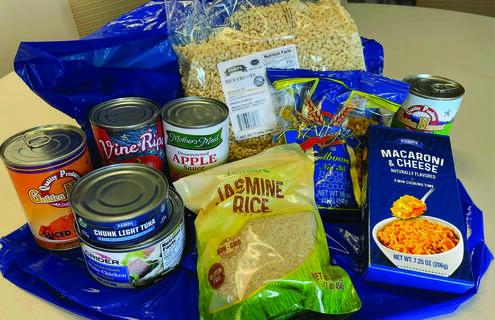
As an APD patient, you may remember answering a screening question like this: “Within the past 12 months, we worried whether our food would run out before we got money to buy more.”
There’s a reason for this question. In 2020, the food insecurity rate in Vermont was 9% and 7% in New Hampshire. In 2022, 13% of adult primary care patients across the Dartmouth Health system screened positive for experiencing food insecurity. At Alice Peck Day Memorial Hospital, 11.2% of adult primary care patients screened positive in 2022.
When the screening question responses started coming in, Karry Smardon, social worker and recovery coach in APD’s Primary Care, wondered, “Why do we ask if we don’t have a solution?”
Smardon and Liz Swanton, Community Health and Engagement officer at APD, started to work on a solution in 2020. “Once COVID started, we saw a real push as food pantries were running out of items and gas prices were increasing,” Smardon said.
Swanton contacted DHMC, which had a new shelf stable food bag program, to see if APD could participate.
“We started the shelf stable food bag program in partnership with The Upper Valley Haven in 2019 and began offering bags to patients in a limited number of departments at DHMC,” said Chelsey Canavan, Manager, Center for Advancing Rural Health Equity. “In my conversations with Liz, we identified an opportunity to expand the program to support APD patients. Today, we serve over 14 departments/clinics across the health system.”
Now when a patient answers the screening question positively, Smardon and her team can offer food bags on the spot. The bags provide food — such as cereal, rice, beans, canned goods, and a can opener — for one to two days for a family up to four.
“The food bags provide immediate support and help engage patients in longer term support for addressing food and other social related health needs,” Smardon said. “I can provide additional resources such as SNAP, the Supplemental Nutrition Assistance Program, and local food pantry information.”
APD was one of the first non-DHMC sites to provide emergency food bags to patients. The APD program has grown — more than 100 bags have been distributed since 2020 — and APD patients are also offered meal cards for a free, hot meal at Alice’s Café; gas vouchers for those in need; and LISTEN vouchers for clothing, all of which is paid for by community benefit dollars.
“None of those things existed in the primary care setting before,” Swanton said. “Now, when we screen patients and identify a need, we have a concrete way to provide support by sending them home with food that day.”